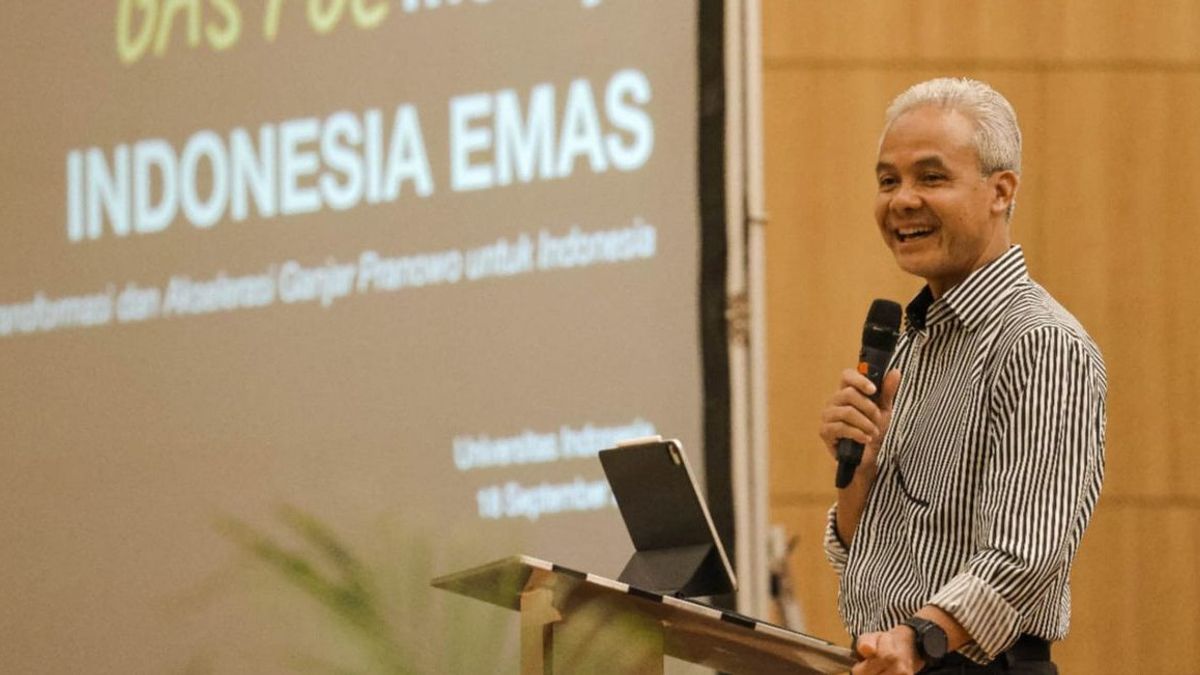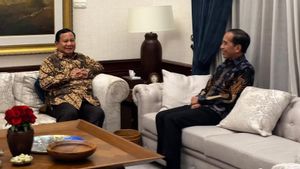JAKARTA - Ahead of the 2024 presidential election, presidential candidates (Readpres) began to spit out their sweet promises in front of millions of Indonesians. This is used by the presidential readings to attract the voices of the people when they fight in the presidential election next year.
As we all know, so far there have been three presidential readings in 2024. They are Prabowo Subianto, Ganjar Pranowo and Anies Baswedan. Only Anies Baswedan has announced the Vice Presidential Candidate by appointing Muhaimin Iskandar as his companion in next year's presidential election battle.
Each of the Presidential Decrees has launched their work programs, including from Ganjar Pranowo. The presidential reading carried out by the PDIP details a number of work programs, including continuing President Joko Widodo's program, one of which is the security of the food sector.
However, Ganjar's promise, which attracted the most attention, was about the former Governor of Central Java wanting to increase his teacher's salary to double digits. He assessed that the decent salary for teachers was Rp. 30 million, and Rp. 10 million for teachers who had just taught. He admitted that he was sad with the economic condition of the teacher who was mediocre.
Raising a teacher's salary of up to Rp. 30 million is certainly enthusiastically welcomed by educators. Understandably, until now the salaries of teachers are said to be low even though they have a crucial role to participate in educating the nation's life.
But on the other hand, raising the teacher's salary to double digits makes many parties smile on the forehead? Where does the budget to raise the teacher's salary fantastically? Maybe this is just a fake promise, as had been done by previous presidential candidates.
For information, the salaries of civil servant teachers in Indonesia start at the lowest level, namely GroupI-A between Rp1,560,800 and Rp2,335,800. According to public policy observer Center of Youth and Population Center (CYPR) Boedi Rheza, what Ganjar wants is correct and rational.
Boedi said that teachers should get a big salary given their high contribution. The teacher's crucial role is not comparable to his income, especially for honorary teachers. Compared to Singapore, teachers' salaries in Indonesia are 20 times lower.
"If you look at the salary level of neighboring teachers, Indonesia is at a low level. The teacher's salary can be increased gradually in the next few years," said Boedi.
However, Director of the Center of Economics and Law Studies (Celios) Bhima Yudhistira has different opinions. Bhima questioned where the budget to raise the teacher's salary was IDR 30 million. It is not impossible, this bombastic policy was difficult to realize when Ganjar was elected president.
"Grant Ganjar about the salary of more than Rp. 30 million for teachers, this is a dream in broad daylight," said Bhima in his statement to VOI.
On the same occasion, Bhima revealed that the attention of the Presidential Decree, especially Ganjar, should not be about the nominal salary. According to him, raising the teacher's salary to up to Rp30 million a month will burden the State Revenue and Expenditure Budget (APBN).
Bhima agrees more if the increase in teachers, whether ASN or honorary teachers, increases every year. The goal is to narrow the gap between ASN and non-ASN teachers in the future. To provide improvements to teachers, it can be done in several ways, including by cutting expenses that are not urgent and cutting unnecessary official travel.
"30 million times the number of teachers in Indonesia, then our APBN will not be able to," Bhima added.
SEE ALSO:
A similar opinion was expressed by the Executive Director of the Institute for Development of Economics and Finance (INDEF) Tauhid Ahmad. With the number of teachers reaching 3.37 million people, he predicts the state must spend Rp. 101 trillion each month only to pay teachers.
"It's really tough," said Tauhid.
Sweet promises always fall from the presidential candidate pair ahead of the presidential election. The campaign promise of the presidential candidates was later referred to as populist policy. Popularism is basically a variety of methods of political approach aimed at attracting support from people whose aspirations were not noticed by the government at that time.
Previously, the term populist was rarely used in the 20th century. Populis was only actively studied in the 1990s. This term was widely used after Donald Trump became popular in the midst of his campaign.
Over time, the term populist is increasingly used. According to Bhima, this populist program always repeats every five years before the presidential election.
The populist program is always expressed once every five years, by whoever the candidate is, Bhima explained.
However, without technical clarity regarding the budget to be used to support populist policies, he is worried that the presidential election promises will only make voters feel disappointment.
Not only because of the election, then making a populist policy. This (policy to raise the teacher's salary to Rp30 million) is not only a populist policy, but abrasud," explained Bhima.
"The teacher's salary agreement of Rp. 30 million per month is too excessive, I'm afraid teachers will be fooled and those who agree to the promise are ready to be disappointed if Pak Ganjar is elected," said Bhima again.
The English, Chinese, Japanese, Arabic, and French versions are automatically generated by the AI. So there may still be inaccuracies in translating, please always see Indonesian as our main language. (system supported by DigitalSiber.id)


















